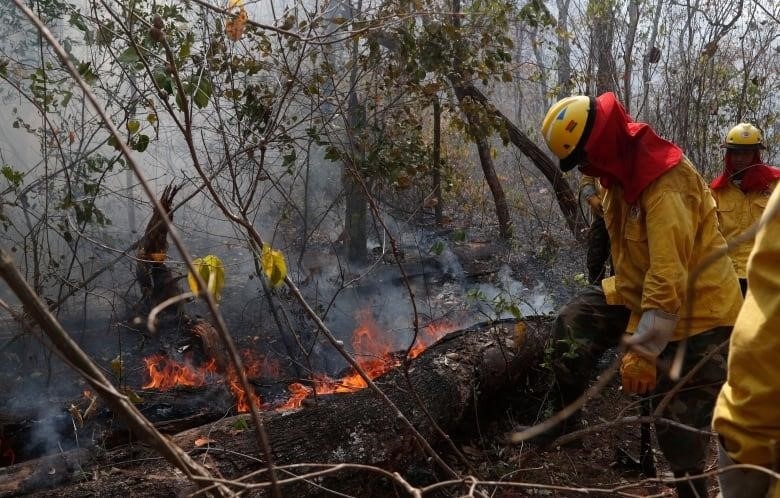Jane Park hiked about 20 kilometers with national park rangers on her first trip to Bolivia in January. They took her to a steep, remote area with endangered palm trees and the Andean, or spectacled, bear.
A wildfire had burned up a lot of El Palmar, which is a protected area of the country.
In a recent interview from Banff, Alta., Park said, “A lot of the places where they are fighting fires are very far away.”
Park is on unpaid leave from her regular job as a fire and vegetation specialist in Banff National Park. She is one of two experts from Alberta who are spending some of their off-season helping the Bolivian government get ready for more fires because of climate change.
It’s part of Global Affairs Canada’s Technical Assistance Partnership, which lets Canadians from different backgrounds share their skills in other countries.

Park saw the job posting online and applied. He got the job, and in January he went to Bolivia to see five of the country’s protected areas.
When the fire started, park rangers took the same path to get to El Palmar, a natural area with integrated management.
Park said, “It’s amazing.” “They walk a very long way. They live there, so they are used to the high altitude and are very fit.
“But if you think that even the fittest rangers would take several hours to walk into a fire, think about how big it would get in that time, and then think about how hard it would be to fight it without planes or good water sources.” “It’s a lot harder.”
Park also said that the rangers fight fires with machetes and portable water bladder packs.
We have to make sure that what we teach them is relevant to their lives.– Jane Park
“In Canada, planes and boats are easy to get to,” she said.
“So, there are definitely some interesting and very challenging conditions that folks have to work with down there. We have to make sure that what we teach them is relevant to their lives.”
Park went back to Bolivia this week and said she is helping the environmental departments improve how they handle things and build up their ability to deal with fires.
“That covers everything, including preventing fires, putting them out, managing them, communicating with people about them, and keeping an eye on them.”
Bolivia’s protected areas have a lot of different kinds of plants and animals, but they are in danger because of drought and longer fire seasons caused by climate change.
Global Forest Watch says that between 2001 and 2021, fires destroyed 1.6 million hectares of tree cover in the country. Some studies have shown that wildfires are one of the biggest threats to birds that are in danger of going extinct or are already in danger.
Park said that as the fires get bigger, last longer, and happen more often, more groups are helping the park service. These groups include community volunteers, fire departments, and the military.
“Because they have the most experience, the park rangers end up having to lead these people who may not have as much,” said Park. “They don’t have enough training on how to manage resources and lead people who might not have as much experience as them.”
Park is helping train these rangers, and another expert from Alberta is working with the Bolivian military at the same time.
Building local knowledg
Mike May, a senior wildfire specialist, said that the military formed a task force with members from the army, navy, and air force to respond to emergencies in places like the Bolivian Amazon.
May signed his contract as a “side job” on top of his regular job. He also spent a week in Bolivia in January to do a needs analysis and will go back this month to give the training.
In an interview from Hinton, Alberta, he said, “They don’t have a lot of money.” “They have a few tools, but maybe not as many as we do in Canada. We have it pretty good up here.”
May, who has helped fight fires in South Africa and Australia in the past, said he would train a group of military people who would then teach the soldiers on the front lines how to fight the fires.
“We want to get them going in the right direction so they can build their wildfire program in the military,” he said.
May said that he and Park agreed that there was a need for cross-agency training, which they will also provide.
May said, “Going to different agencies and jurisdictions to see how they handle wildfires is always interesting and unique.” “I have no doubt that Bolivia will teach me some good things.”
He said that he feels lucky to have the chance and offer some of his knowledge.
May added, “We’re Canadians, and all we want to do is help people.”
